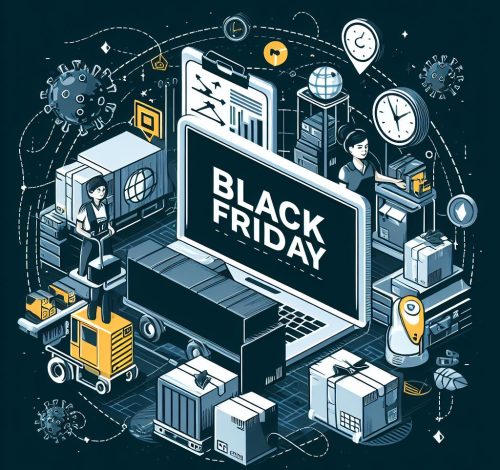Quick access
Black Friday

Introduction ⬇️
In the United States, a large number of employers allow their employees to take a day off on Black Friday. This sentence reflects the extent to which Black Friday has become significant in our current society. And if that doesn’t resonate with you, perhaps this figure will: according to GfK Market Intelligence, the 2022 Black Friday week in France generated over 802 million euros in revenue.
But where does this phenomenon come from? You undoubtedly know its principle, but what about its origins? And are you aware of the behind-the-scenes of this global event and what it implies in terms of logistics?
Learn more
Let’s start with a brief explanation of what Black Friday is. It’s a commercial event that takes place every year on the fourth Friday of November; this year, the date is November 24th. The event actually starts early in the week and then extends throughout the weekend, known as the “Black Week“.
This must-attend event is gaining popularity, appealing to both consumers and retailers. On one hand, consumers have access to reduced prices just before the holiday season. On the other hand, it’s a commercial opportunity for retailers who significantly increase their sales and, consequently, their revenue. It’s worth noting that Black Friday involves both physical and online sales (e-commerce).
The term “Black Friday” first appeared in the 1950s in the United States. The story states that after Thanksgiving, many Americans are off work and take advantage of this free time to do their Christmas shopping. Streets are “black” with people, hence the name “Black Friday”. The commercial aspect of BF as we know it today came a little later in the 1960s. Discounts became widespread, mainly in physical stores, before extending to online commerce. In France, BF was first popularized by the internet (e-commerce), notably thanks to Amazon, a pioneer in this practice.
Who participates? BF has become so significant that it’s now essential for retailers, with almost all brands participating. The most affected sectors are electronics, appliances, fashion, and toys/leisure.
From a logistical perspective, Black Friday presents a real challenge. Indeed, logistics providers like Futurlog must deal with significant spikes in order volumes. Some retailers even multiply their usual number of orders by 10. This is where the expertise of the logistics provider comes in. Aware of the challenges, they know how to anticipate and manage these fluctuations in demand.
At Futurlog, we have implemented concrete actions to improve our performance and that of our clients during these critical periods. To learn more, check out our blog about the 👉 Peak Season 👈.
 Feel free to share:
Feel free to share: 

